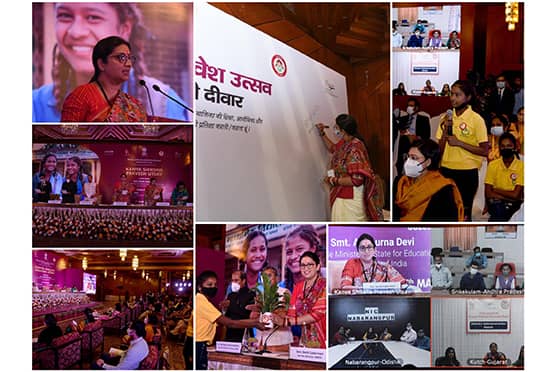Ministry of women & child development launches ‘Kanya Shiksha Pravesh Utsav’


On the eve of International Women’s Day, the ministry of women and child development (MoWCD), in partnership with the ministry of education and UNICEF, launched Kanya Shikhsa Pravesh Utsav, a campaign to bring out-of-school adolescent girls in India back into the formal education and/or skilling system.
The event saw the presence of Union minister of women and child development, Smriti Zubin Irani, minister of state, MoWCD, Mahendrabhai Munjpara, and minister of state, ministry of education Annpurna Devi. The national and state secretaries from MoWCD, MoE and representatives from across the country were also present.
Furthermore, Anganwadi workers and adolescent girls from different parts of the country joined the event, and many participated virtually. This included the participation of adolescent girls who shared their experiences about being reintegrated into schools.
The campaign has been launched with the objective of enhancing enrolment and retention of girls between 11-14 years of age in school. The initiative intends to build on the existing schemes and programmes like Schemes for Adolescent Girls (SAG), Beti Bachao Beti Padhao (BBBP) and the National Education Policy (NEP) to work on a comprehensive system for out of school girls.The campaign will be rolled out under the umbrella of MoWCD’s BBBP initiative by targeting more than 400,000 out of school adolescent girls as primary beneficiaries.
Emphasising on the Government of India’s commitment to the education of girl children, Irani remarked that the government fully acknowledges the need to work with women and girls and commits to make sustained investment in health, education, protection, skill building including financial literacy, while empowering young women and girls, and promoting gender-equitable attitudes and practices among India’s children and youth.
Explaining the programme, Indevar Pandey, secretary, MoWCD announced that over 400 districts across all states will be funded under the “Beti Bachao Beti Padhao” scheme for outreach and awareness generation at grassroot level to sensitise communities and families to enrol adolescent girls in schools, over and above the funding from Samagra Shiksha Abhiyan and the anganwadi workers (AWWs) will be further incentivised for counselling and referring out of school adolescent girls. He also emphasised the importance of collaborative efforts between MoWCD and MoE for identifying the beneficiaries and appropriate enrolment into formal schooling or vocational training programmes.
The secretary of the department of school education and literacy, Anita Karwal shared comprehensive initiatives implemented under the department that can be availed by adolescent girls, and the aim for ensuring integrated education services to create an inclusive environment and infrastructure for education.
The programme aims for a convergent approach between MoWCD and MoE with close partnership of international organisations. Stressing this, the Annpurna Devi said, “It has been crucial for ministry of education to prioritise girls’ enrolment in the past years but in the light of the last two years of pandemic, it becomes imperative to join our efforts and systemically leverage support for girls’ enrolment and retention in school, with a focus on supporting girls transitioning into secondary education and completion.”
Yasumasa Kimura, deputy representative, UNICEF India underlined the importance of such programmes, “Education for girls not only fulfils their right to learning and finding better opportunities in life and work, but it also contributes to building thriving and resilient societies that give all people – including boys and men – the opportunity to realise their full potential as individual and citizens of the world.”